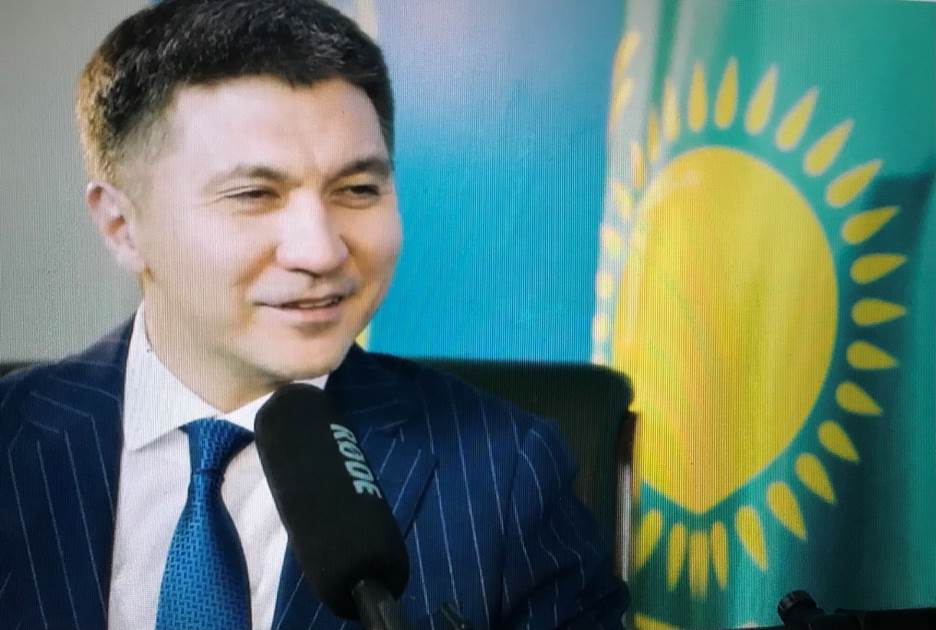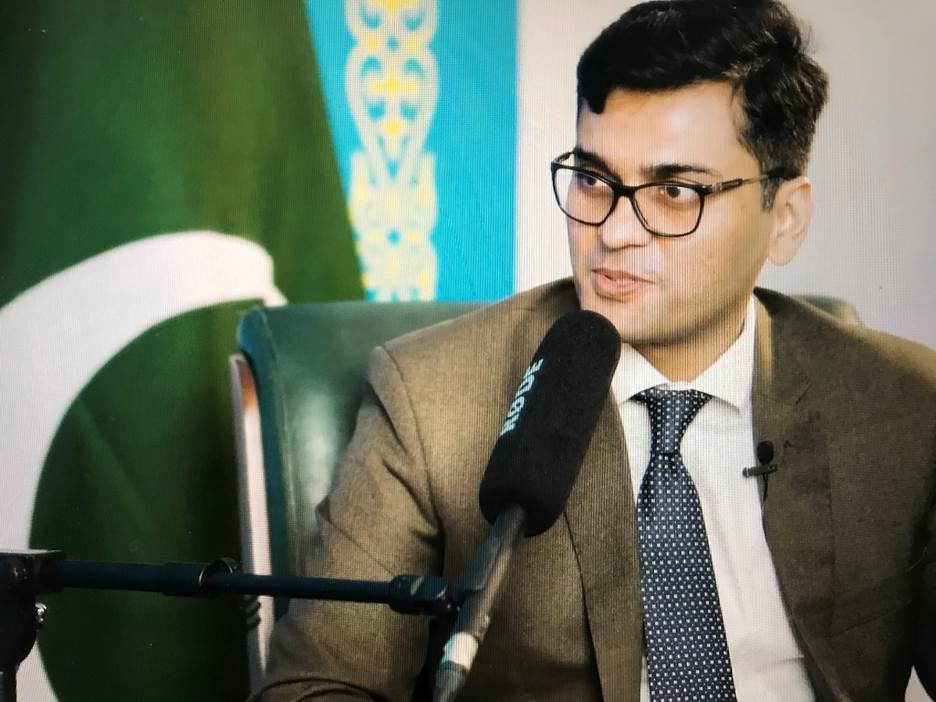
Ambassador Yerzhan Kistafin

Usama Nizamani
Kazakhstan Ambassador Yerzhan Kistafin on InferTalks
By Elaine Pasquini

Washington: Yerzhan Kistafin, Kazakhstan’s ambassador to Pakistan, was Usama Nizamani’s special guest on the June 21, 2023, episode of InferTalks, a digital platform offering news and insights on global issues.
Beginning the conversation, Nizamani broached the subject of climate change which is a major challenge for both countries. He cited the recent horrific forest fires in Kazakhstan’s Abai region which killed 14 people and destroyed some 60,000 hectares, Pakistan’s devastating floods last year, and more recently rain-related incidents in early June which killed 27 people in the Khyber Pakhtunkhwa region.
The ambassador related that Pakistan and Kazakhstan will work together on climate change to identify, address and find solutions for their common problems. “We have to exchange information…to make our people and authorities ready to resist such challenges that we face today in the world,” he observed, adding that Kazakhstan provided flood relief financial assistance to Pakistan last year.
Asked about protests over rising fuel costs in Kazakhstan in January 2022, Kistafin explained that President Kassym-Jomart Tokayav implemented reforms, such as a single seven-year presidential term to give more power to the parliament and local representative bodies. “We’re moving gradually from a presidential democracy to a parliamentary democracy to finally make the parliament of Kazakhstan the key body in terms of furthering our internal agenda as well as foreign policy and the issues we are discussing at the national level,” he said. “The final goal is to liberalize our society, to make our government accountable to our civil society and to further our democratization process.”
The ambassador went on to discuss how Kazakhstan and Pakistan are working closely together to increase regional integration and connectivity. President Tokayav and Pakistani Prime Minister Shehbaz Sharif have been discussing these issues with a special focus on developing economic cooperation and strengthening bilateral trade.
Connecting ordinary people together is important, too, Kistafin commented. “I always say that our peoples or societies still know little about each other. We need to fill the gap, which could be helped by increasing cooperation between Kazakh and Pakistani media communities to raise awareness of our peoples and to deliver more information about Pakistan and deliver positive news.” For example, many Kazakhs, he related, are unaware that Pakistan produces nearly 70 percent of all soccer balls in the world, is the number one producer of surgical instruments and among the top ten in the textile industry.
“To increase interaction between our business communities, people-to-people ties, academia, students and young people,” direct flights between Almaty and Lahore were launched July 8, Kistafin said. Plans are expanding to connect Almaty and Karachi this fall and to eventually connect Astana and Islamabad.
Kazakhstan, being the largest land-locked country in the world, is looking to connect to Pakistani ports on the Arabian Sea, which will be “beneficial not only to our two countries but for the entire region,” he added.
Even though Kazakhstan is one of the top ten wheat exporters in the world, presently it’s cheaper to deliver wheat to Pakistan from Ukraine, rather than from Kazakhstan because of lack of connectivity. The government is working to resolve this, he said. Providing easier access out of Kazakhstan would allow the country to deliver wheat not only to Pakistan – which expressed interest in importing up to two million tons of wheat – but to other countries on other continents.
Last year, a delegation of Kazakh businessmen representing the textile industry, agriculture, IT, surgical instruments, sports goods, leather, construction, along with education, visited Lahore, Karachi and Islamabad. “To boost our bilateral trade, we need to organize such visits on a regular basis to raise awareness in our business communities about opportunities,” he enthused.
There are challenges to doing business for foreign investors that need to be smoothed out, however, such as improving banking channels for financial transactions and speeding up the visa issuance process. Kazakhstan is forming a Transit Trade Agreement with Pakistan to facilitate direct interaction and is in talks about developing cooperation between their customs administrations.
The ambassador highlighted the Astana International Financial Center established in 2017 – “a kind of investment oasis for foreign companies to enjoy” – which mirrors the Dubai financial center, a platform operated under common English law with an international court – separate from the judicial jurisdiction that operates in the rest of the country. Microsoft recently announced it would establish a regional office there.
Developing interaction between both countries’ youth through education will be addressed in August when leaders of universities in Pakistan will meet with their counterparts in Kazakhstan to develop direct interaction and strengthen ties in this area. Especially in light of Pakistan’s large youth population, Kistafin said, “focus on education is the right approach and…in our region education is not only about education it is also about security. The better educated our young people are the safer the situation is.”
Ending with a discussion on Afghanistan, Kistafin noted that for the region to prosper or develop, Afghanistan needs to be stable. “This is a key factor that everyone understands and acknowledges.” Since 2010, Kazakhstan has provided scholarships for Afghan students to study at Kazakh universities. “The main idea was to change their mindset, to show them that we are a country in the same region but we have another way of life, and to try to convince them that there are other ways for living, for developing our countries and our region,” he said.
Kazakhstan’s embassy remains open in Kabul and the government has constructive relations with the Taliban, he stated. Kazakhstan wants to restore economic cooperation and bi-lateral trade, in addition to continuing to provide humanitarian assistance – especially wheat – to the Afghan people at least to overcome the severe crisis they face today.
“We believe that this approach is the right one to develop cooperation with the Taliban,” Kistafin said. “Afghanistan needs to be a part of our regional cooperation and connectivity.”
(Elaine Pasquini is a freelance journalist. Her reports appear in the Washington Report on Middle East Affairs and Nuze.Ink.)

